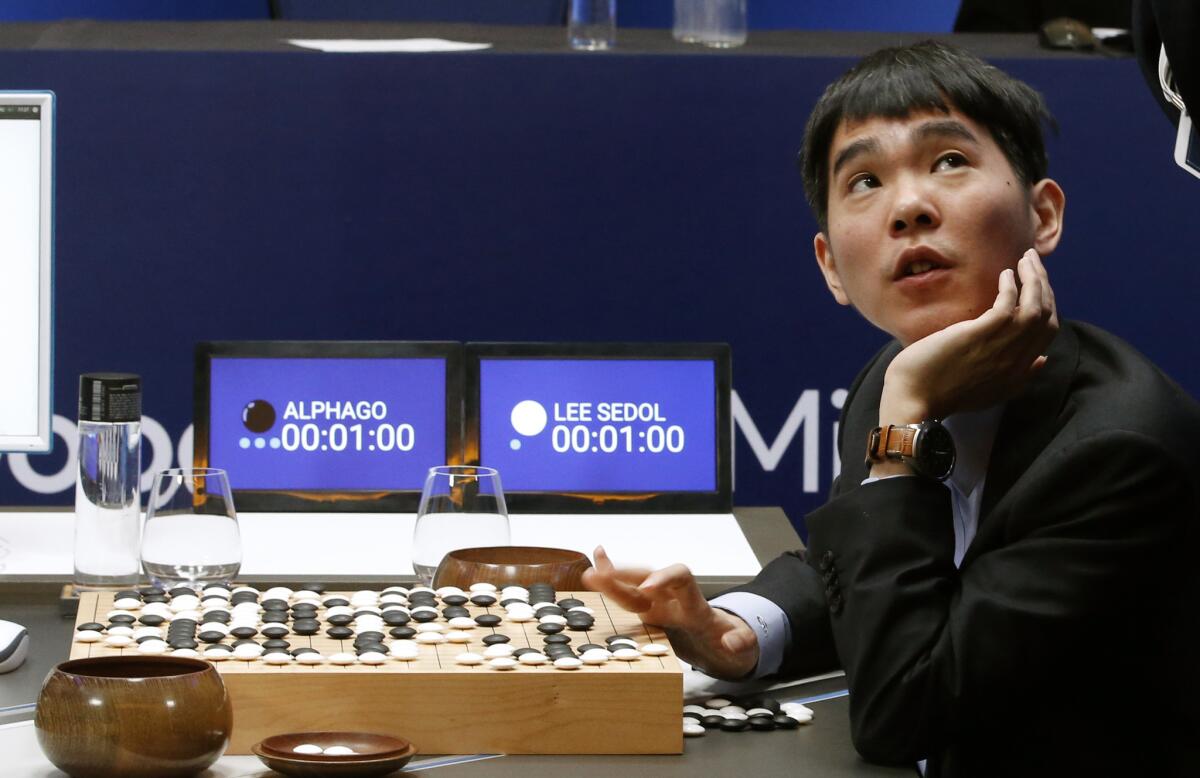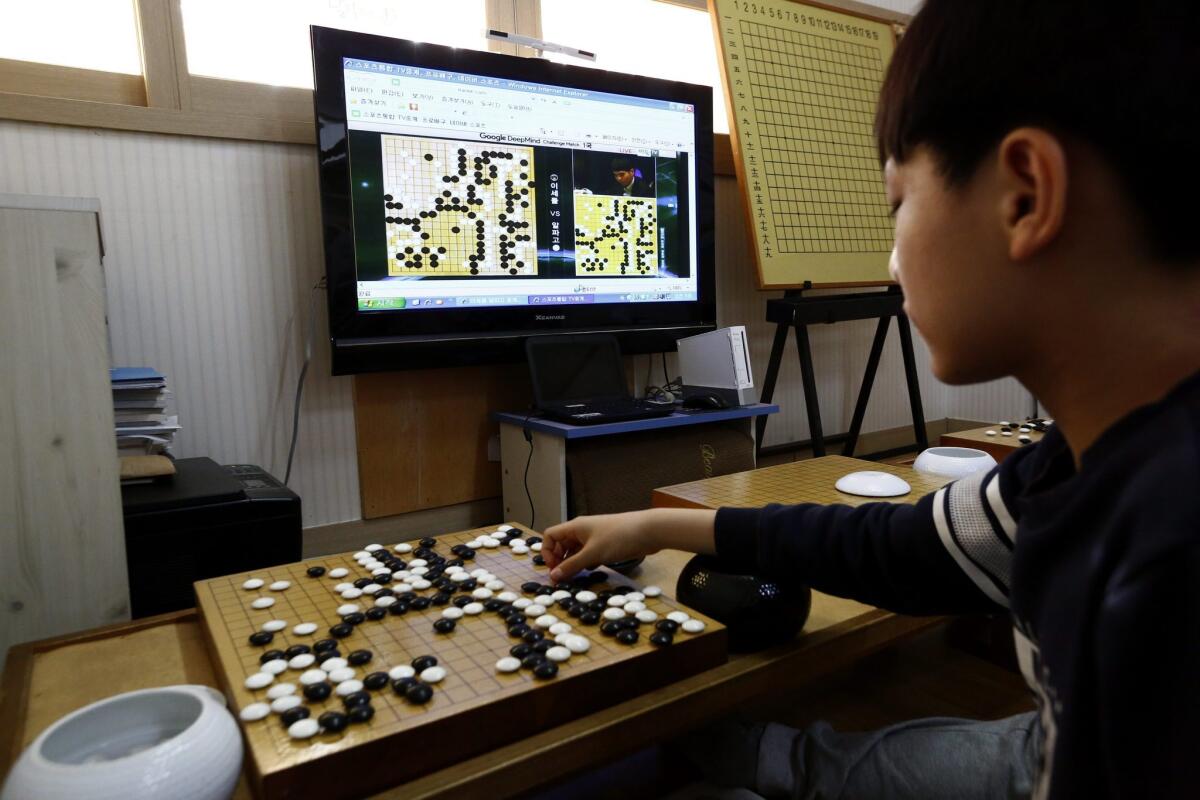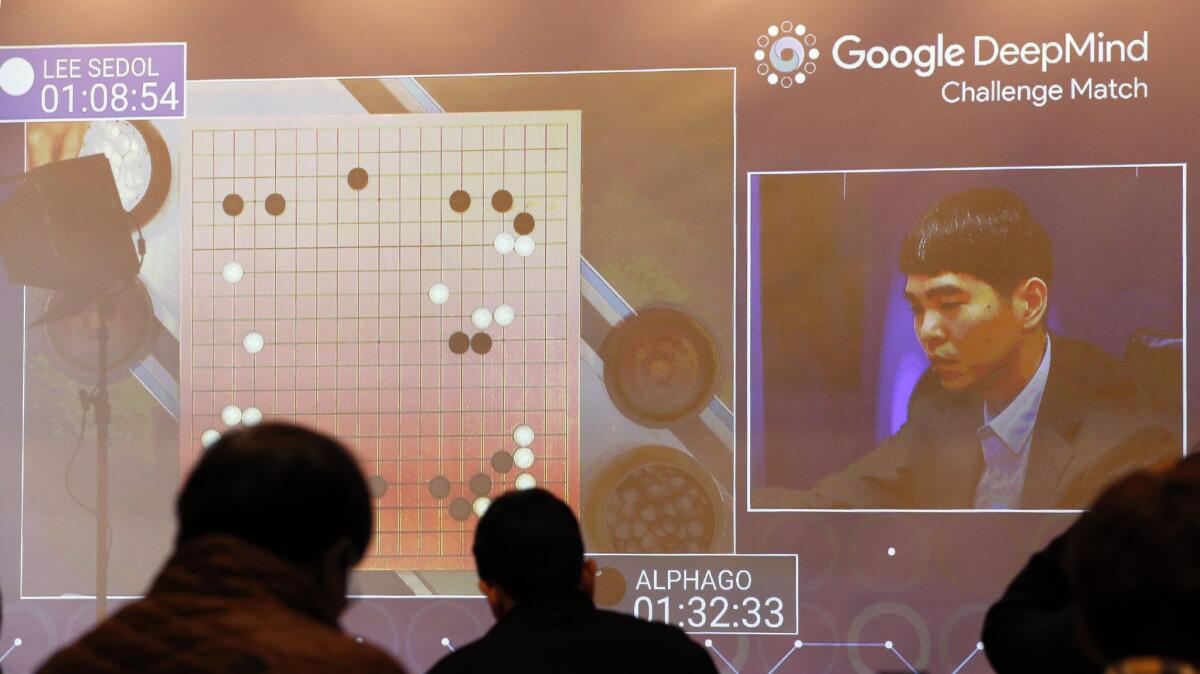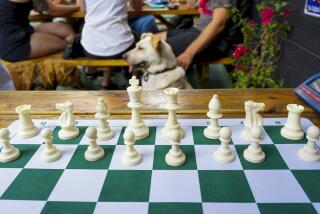On the Ground: The King of Go meets his match in a computer, and a country watches in disbelief

South Korean Go master Lee Sedol at the board after losing his second match to the Google DeepMind artificial intelligence program AlphaGo in Seoul.
Reporting from SEOUL — For more than four hours, Lee Sedol hunched over the game board, fidgeting from side to side as he stared at the black and white tiles, running through his dwindling options.
Exasperated and tired, Lee — the world’s top-ranked Go player, whose prowess at the ancient game has cemented him as a legend — finally conceded defeat to an opponent that never seemed to wilt: a computer.
“Yesterday I was surprised, but today it’s even more than that,” the South Korean said, his forlorn expression captured on the video cameras recording the event in the lobby of a swanky Seoul hotel.
Now down 2-0 in the best-of-five competition with AlphaGo, a computer programmed to play at such a relentless pace that it seemed to know every conceivable move, Lee is on the brink of elimination.

A South Korean elementary school student watches a live stream of the match as human Go champion Lee Sedol battles AlphaGo.
In a country where the game is part of the cultural fabric, the turn of events has been staggering.
“Here in Korea, back in the U.S. and all over the world, there is much more sadness and introspection than I expected,” said American Go Assn. President Andrew Okun, who flew in from Los Angeles to watch the match.
“I think people were guessing with their heads that AlphaGo had a good chance, but hoping with their hearts that Lee Sedol would win,” he added.
Lee’s faceoff with AlphaGo, an artificial intelligence program developed by Google DeepMind, has been the subject of fevered attention in the tech world, and in South Korea, where Lee is a homegrown hero and Go is a popular pastime. Hundreds of thousands watched livestreams of the contests and the results have dominated headlines.
With Go aficionados, there is building excitement about the new level of attention AlphaGo is bringing to the game. But not everyone is thrilled with the new computer master.
Was Lee at an unfair advantage, some Korean netizens wondered? Could a mere mortal triumph over an IT powerhouse that had been force-fed every possible combination of outcomes?
Jeon Seok-jin, a lawyer who specializes in information technology, suggested that the deck had been stacked against Lee from the outset. Jeon pointed out that AlphaGo had the ability to draw on a massive database of moves from thousands of games.
Google DeepMind, he said in a Yonhap News Agency report, was nothing less than guilty of “insulting the 2,600-year history of Go.”
The Kyunghyang newspaper seemed to view the game with an end-times sentiment. “Shocking! An Event that Requires an Exclamation Point,” it said, wondering, “Has the world where machines overwhelm the human race dawned?”
But for the most part, more than bristling over the struggles of their native son, South Koreans have marveled at the proficiency of AlphaGo.
Won Yoo-cheol, the floor leader of the ruling Saenuri Party, stopped by the games this week and came away so impressed by AlphaGo that he told reporters he had seen the future.
“For the future of our nation’s youth, we need legislation that will pave the way for us to create new technology like AlphaGo.”
Though Go may be little known in the U.S., it’s popularity in South Korea, China and Japan borders on addiction. The Korea Baduk Assn. (“baduk” is the Korean word for Go) estimates that there are 50 million players in East Asia, and South Korea has two 24-hour TV networks dedicated to Go. Myongji University in Seoul even offers a degree in Go studies.
Go appears to be a simple game, but its complexities can be confounding. It is played using black and white tiles on a grid board and offers a practically endless range of moves. Successful players must have the ability to anticipate the game’s twists and turns.
Demis Hassabis, chief executive of Google DeepMind, put it this way: “There are more possible positions on a Go board than atoms in the universe.”
In October the program beat Fan Hui, the European champion, but experts had predicted that Lee would be a far tougher opponent. Yet AlphaGo’s dominance in the first two matches wasn’t entirely unexpected. The program’s effectiveness comes not from raw computing power but from lessons learned from being shown millions of pictures of Go games played by humans, and honing its skills by playing countless games against itself.
Google DeepMind, a London-based company founded in 2010 and acquired by Google in 2014, designed neural networks and a state-of-the-art tree search program to recognize and learn the best moves in a broad range of scenarios.
After Thursday’s game, even Hassabis was impressed by AlphaGo’s performance, saying at a news conference, “AlphaGo played some really surprising and beautiful moves in this game.”
If Lee loses Saturday, he will have lost the match and the $1 million in prize money (Google has said that if AlphaGo wins, the company will donate the prize money to charity).

South Korean Go master Lee Sedol’s match against AlphaGo is projected on a big screen in the media room of the Seoul hotel where the best-of-five contest is being played.
In that case, Lee would then be playing only for pride, as all five games must be played out in accordance with Go convention.
As Lee rests and waits for Round 3, life in Seoul hums along.
A couple of miles from the hotel where Lee and AlphaGo are competing, elderly men gathered at Tapgol Park for the daily games of Go.
Instead of chatting about the games unfolding at the park, however, most of the men buzzed about AlphaGo’s domination. Choi Joo-hwa, a grandfather clad in a ski cap and black parka against Seoul’s late-winter chill, said he has played Go since his childhood and never expected to see a computer beat the game’s top players.
“I thought that Lee Sedol would definitely win,” Choi said. “I guess nowadays computers can do everything.”
Borowiec is a special correspondent.
ALSO
Searching for the next NBA sensation in the world’s second most populous nation
Fukushima B&B: It’s for dogs (and cats). Kevin Costner hangs out in the dining room
How a state senator — whose family is in the taxi business — put the brakes on two Uber bills
More to Read
Sign up for Essential California
The most important California stories and recommendations in your inbox every morning.
You may occasionally receive promotional content from the Los Angeles Times.










